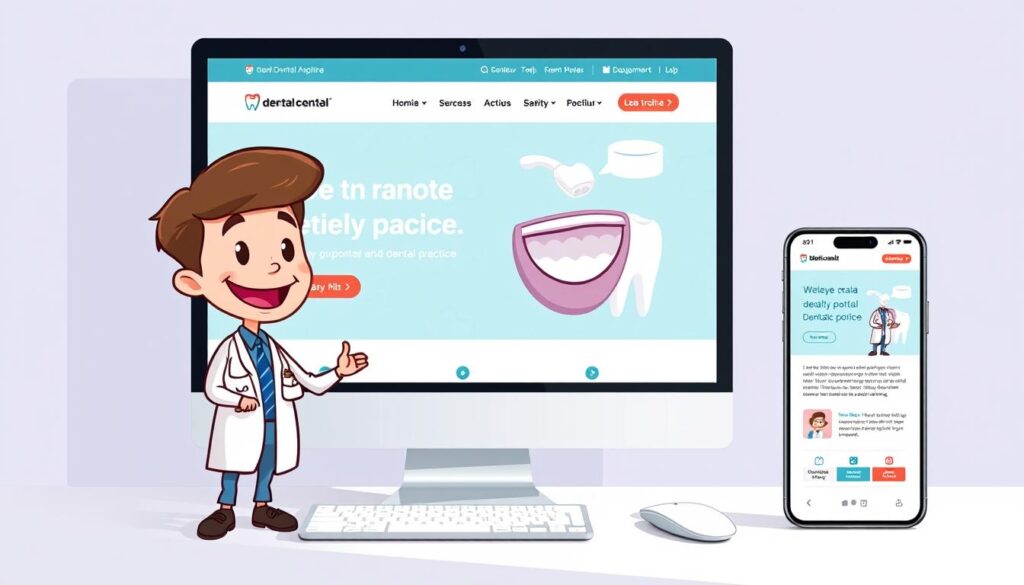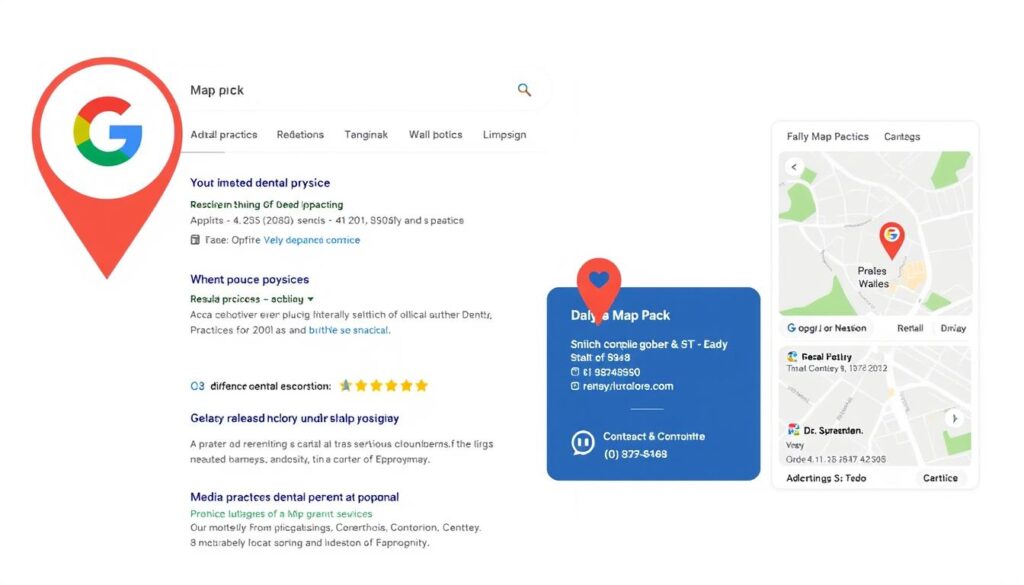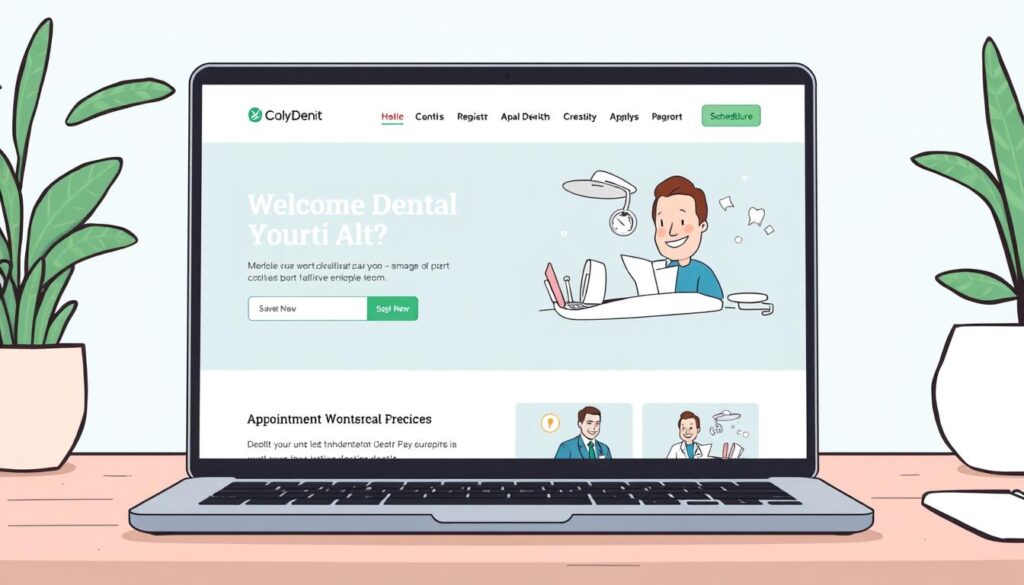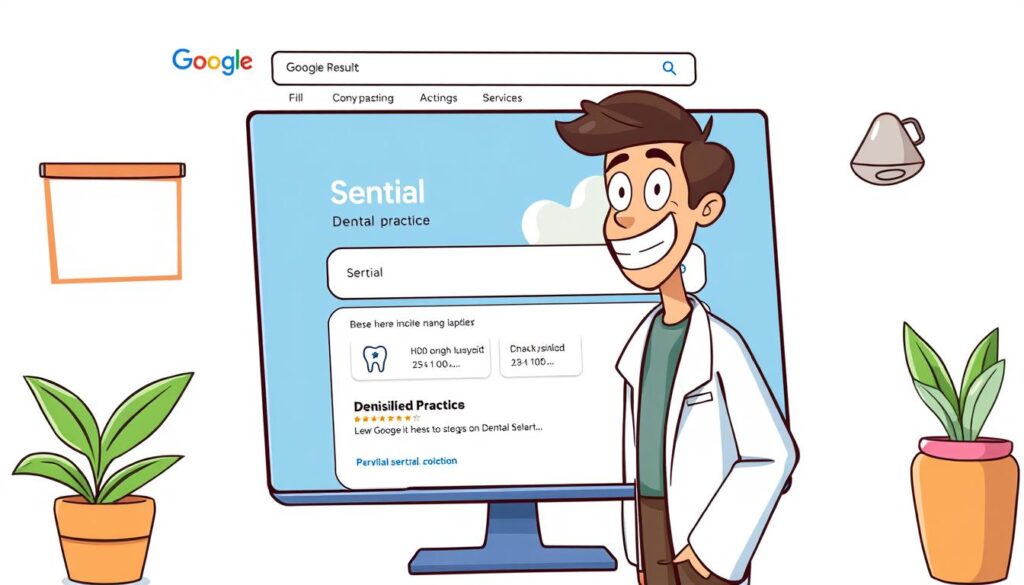Your cart is currently empty!

A significant 75% of people use the internet to find local services, including dental care. This shift in consumer behavior underscores the importance of having a robust digital presence for dental practices.
The digital landscape has transformed how dental practices connect with potential patients. A well-designed website and a comprehensive marketing strategy are now essential components of practice growth.
By leveraging digital marketing, dental practices can increase their visibility, attract more patients, and ultimately drive business growth.
Digital marketing is revolutionizing the way dental practices reach and engage with their patients. The shift towards online channels has transformed the marketing landscape, making it essential for dental practices to adapt their marketing strategy to stay competitive.
The competitive advantage of online marketing lies in its ability to target specific patient demographics, track results in real-time, and adjust strategies based on performance data. Dental practices that fail to embrace digital marketing risk losing market share to competitors who effectively leverage online channels to attract and engage potential patients.

By adopting a robust marketing strategy that includes digital channels, dental practices can significantly enhance their online presence and attract more patients to their practice.
In today’s digital age, understanding online marketing is vital for dentists to stay competitive.

Effective online marketing for dentists involves a multi-faceted approach. A comprehensive marketing strategy should integrate multiple digital channels to create a cohesive brand presence.
A successful dental marketing strategy includes several key components: Local SEO, Traditional SEO, Google Search Ads, Local Search Ads, Social Media Marketing, Content Marketing, Email Marketing, UX Improvements, and Reputation Management.
These components work together to enhance your online visibility and attract new patients to your practice.
Setting goals is essential for tracking the effectiveness of your marketing efforts. Your marketing goals should be specific, measurable, achievable, relevant, and time-bound (SMART).
By establishing clear goals, you can develop a focused marketing strategy that drives growth for your practice through digital marketing.
Your dental practice’s website is often the first point of contact with potential patients, making its design and functionality critical.

An effective dental website should convey professionalism, expertise, and a patient-centered approach. Essential elements include clear service descriptions, prominent contact information, and online scheduling capabilities.
Incorporating compelling visual content, such as before-and-after galleries and team profiles, helps build trust and emotional connection with website visitors.
With over 60% of dental service searches occurring on mobile devices, mobile optimization is non-negotiable. A responsive design ensures that your website is accessible and user-friendly across various devices.
User experience factors, such as page load speed and intuitive navigation, directly impact how potential patients perceive your practice’s attention to detail and care.
Local SEO is a vital component of digital marketing for dentists, helping them reach patients in their immediate area. In dentist digital marketing, one of the most important areas of SEO is the “map pack” results that you see in Google’s search results.

Claiming and fully optimizing your Google Business Profile is the foundation of local SEO success. This requires accurate business information, service categories, and regular updates to ensure that potential patients have the most current information about your dental practice.
By optimizing your Google Business Profile, you can improve your visibility in local search results and attract more patients to your practice.
Strategic use of location-based keywords throughout your website content helps search engines understand your practice’s service area and relevance to local searches. Building consistent citations across online directories reinforces your practice’s location data and improves visibility in local search results.
Encouraging patients to leave Google reviews directly impacts your local search rankings and influences potential patients’ decision-making process when choosing a dental provider.
In today’s digital age, a well-planned SEO strategy is vital for the success of dental practices.

Comprehensive SEO for dental practices involves multiple facets, including technical website elements, content quality, and authority building strategies. A robust SEO strategy enhances your practice’s online presence, driving more qualified leads.
One of the most effective SEO initiatives for dental practices is to create dedicated landing pages for each service offered, such as implants, cosmetic procedures, and orthodontics. This allows for targeted optimization and improved search visibility.
By having service-specific landing pages, you can tailor your content and keywords to match the specific needs and search queries of potential patients, thereby increasing the relevance and effectiveness of your website.
Implementing on-page SEO best practices is crucial for dentists. This includes strategic keyword placement in page titles, headers, meta descriptions, and throughout the content in a natural and readable manner.
Additionally, technical SEO factors such as site speed, mobile responsiveness, secure connections (HTTPS), and structured data implementation significantly impact search engine rankings. Ensuring these elements are optimized will improve your website’s visibility and user experience.

For dental practices seeking immediate visibility and growth, Google Ads offers a powerful solution through targeted advertising campaigns. With Google Ads, dental practices can appear at the top of search results, capturing the attention of potential patients actively searching for dental services.
Paid advertising offers several key benefits for dental practices. It provides immediate visibility at the top of search results, bypassing the time investment required for organic SEO strategies to mature. Google Ads allows for precise targeting of high-intent keywords like “emergency dentist near me” or “cosmetic dentistry consultation,” indicating immediate patient needs.
Understanding the distinction between standard search ads and local search ads is crucial. Standard search ads appear in traditional search results, while local search ads integrate with Google Maps results, providing a more targeted approach to reaching local patients.
The choice between these ad types depends on the practice’s specific marketing goals. For instance, local search ads are ideal for practices looking to attract patients from their immediate vicinity.
Effective dental ad campaigns require several key elements. First, compelling ad copy is necessary to address patient pain points, highlight unique practice benefits, and include strong calls-to-action. Strategic bid management and budget allocation across different service lines help maximize return on advertising investment by focusing resources on the most profitable treatments.
Implementing conversion tracking allows practices to measure exactly which ads are generating appointment bookings, phone calls, and other valuable patient actions. This data is crucial for refining ad campaigns and improving overall marketing efficiency.
By embracing social media marketing, dental practices can humanize their brand, showcase their team’s personality, and foster meaningful relationships with patients. This approach allows dental offices to build trust and familiarity with potential patients through platforms like Instagram, Facebook, and TikTok.

The selection of social media platforms should be strategic. Facebook is ideal for reaching older demographics and facilitating community building, while Instagram and TikTok excel at visual storytelling, particularly for cosmetic services. This strategic choice enables dental practices to tailor their marketing efforts effectively.
Effective content on social media balances educational value with engaging, shareable content that reflects the practice’s culture. Behind-the-scenes content, staff spotlights, and patient transformation stories create emotional connections. Consistent posting schedules and visual branding across platforms reinforce practice recognition and professional credibility.
By leveraging social media marketing, dental practices can demonstrate responsive patient communication through comments and messages, further enhancing their reputation and team approachability.

Dental practices can significantly benefit from incorporating content marketing into their online strategy. Content marketing is another dental digital marketing strategy that your practice should consider. Broadly, the premise behind content marketing is to create helpful and educational online resources.
Content marketing positions your dental practice as an authoritative resource for oral health information, building trust with potential patients before they ever contact your office. By creating valuable content, you can attract and engage with your target audience.
Strategic blog content addressing common patient questions and concerns helps capture search traffic from individuals researching dental issues or procedures they’re considering. Educational content that explains complex dental procedures in accessible language reduces patient anxiety and increases treatment acceptance rates.
Creating content that addresses specific patient demographics (parents, seniors, cosmetic-focused patients) allows for targeted marketing to your ideal patient profiles.
Video content is particularly effective for dental marketing, allowing potential patients to see your office environment, meet team members, and visualize treatment outcomes. Repurposing content across multiple channels (website, email newsletters, social media) maximizes the return on your content creation investment and reinforces key messages.
By leveraging both blog and video content, your dental practice can establish a robust content marketing strategy that attracts and educates patients.

Effective email marketing allows dental practices to stay top-of-mind with patients, fostering loyalty and encouraging new appointments. Email is another essential digital communication method that enables dental practices to include infographics, videos, images, and written information in their messages to patients, allowing for direct marketing and communication.
Building a robust email list requires strategic opt-in opportunities throughout the patient journey, from website visits to in-office interactions. This involves creating opportunities for patients to subscribe to newsletters, appointment reminders, and promotional emails. By doing so, dental practices can compile a comprehensive list of patients who are interested in receiving marketing communications.
Email campaigns can be highly effective when tailored to the specific needs of dental patients. Effective dental email campaigns include appointment reminders, treatment follow-ups, practice newsletters, special promotions, and educational content that reinforces your expertise. Segmenting your email list by patient type, treatment history, or recall schedule allows for highly targeted communications that generate better engagement and response rates. Personalization elements like patient names, treatment-specific information, and relevant recommendations significantly improve email open and action rates.
Automated email sequences for new patients, post-treatment care, and reactivation of dormant patients save staff time while maintaining consistent patient communication. By leveraging these strategies, dental practices can enhance patient relationships and drive long-term growth.

As a dentist, managing your online reputation is vital for the success and growth of your practice. In the digital era, potential patients often rely on online reviews to make informed decisions about their dental care.
Proactive reputation management involves systematically monitoring review platforms such as Google, Yelp, and Healthgrades. Responding professionally to all reviews demonstrates your practice’s commitment to patient satisfaction.
Key aspects of review management include:
Implementing a systematic review generation strategy can increase your positive review volume. This involves inviting satisfied patients to share their experiences.
Effective strategies include:
By effectively managing your online reputation, you can enhance your practice’s credibility and attract more patients. This involves not just responding to reviews but also using the information to improve your services.
Measuring the success of your dental marketing strategy is essential to understand what’s working and what needs improvement. Effective dental marketing requires a systematic approach to measuring key performance indicators that directly connect to practice growth and revenue objectives.
To gauge the effectiveness of your dental marketing efforts, you need to track essential metrics. These include new patient acquisition costs, website conversion rates, appointment request sources, treatment acceptance rates, and return on marketing investment. By monitoring these metrics, you can gain valuable insights into patient behavior patterns and identify areas for improvement.
Regular performance reviews should inform strategic adjustments, reallocating resources from underperforming channels to those delivering the strongest results. By analyzing your results, you can refine your strategy to achieve your goals and drive practice growth. This data-driven approach ensures that your dental marketing efforts are optimized for maximum ROI.

To take your dental practice to the next level, a comprehensive online marketing strategy is no longer optional, but essential. Digital marketing for dentists may seem overwhelming at first, but learning to utilize these strategies to your advantage can generate significant returns.
By implementing a cohesive marketing strategy that integrates multiple channels, dental practices can guide potential patients through awareness, consideration, and decision stages. This approach not only drives practice growth but also provides measurable results, allowing for data-driven optimization.
Starting with foundational elements like website optimization and Google Business Profile management creates a strong base for more advanced digital marketing initiatives. Working with professionals who understand the unique aspects of marketing dentists can accelerate results.
A well-designed website is crucial for a dental practice as it serves as the first point of contact for many potential patients, providing them with essential information about services, location, and team. It helps establish credibility and can significantly enhance patient engagement.
Local SEO is vital for dental practices as it enables them to appear in search results for location-based queries, making it more likely for potential patients in their area to find them. This involves optimizing the Google Business Profile and using local keywords.
Social media can be an effective tool for dental practices to connect with patients, share educational content, and promote their services. Choosing the right platforms and creating engaging content are key to a successful social media strategy.
Content marketing plays a significant role in attracting dental patients by providing valuable information that addresses their concerns and needs. Blogging about relevant dental topics and using video content can help establish a practice’s expertise and build trust with potential patients.
Email marketing can help nurture patient relationships by keeping them informed about practice news, services, and tips for oral health. Building an email list and creating effective campaigns can encourage patient loyalty and retention.
Online reputation management is crucial for dental practices as it involves monitoring and responding to patient reviews, which can significantly impact a practice’s credibility and attractiveness to potential patients. Strategies to generate positive reviews can also enhance a practice’s reputation.
Key performance indicators such as website traffic, social media engagement, email open rates, and conversion rates can help measure the success of dental marketing efforts. Tracking these metrics allows practices to adjust their strategies based on results.
Google Ads can provide immediate results for dental practices by increasing their visibility in search results for relevant queries. Creating effective ad campaigns involves choosing between search ads and local search ads and targeting the right keywords.
“dental office name ideas”
Here is a potential meta description:…
Discover the top names of dental…